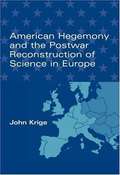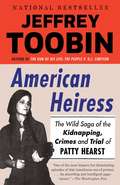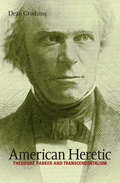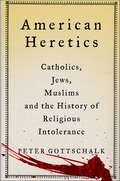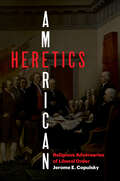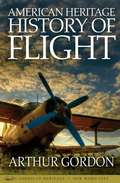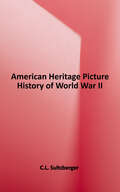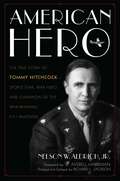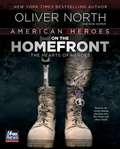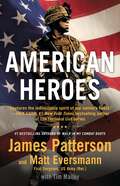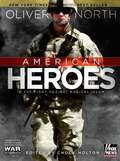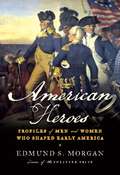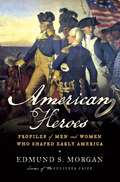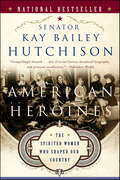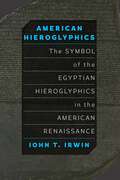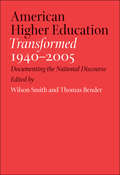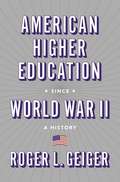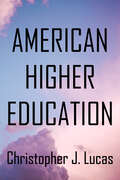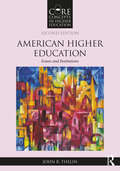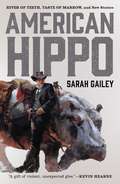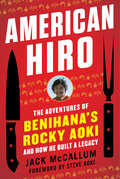- Table View
- List View
American Hegemony and the Postwar Reconstruction of Science in Europe
by John KrigeIn 1945, the United States was not only the strongest economic and military power in the world; it was also the world's leader in science and technology.
American Heiress: The Wild Saga of the Kidnapping, Crimes and Trial of Patty Hearst
by Jeffrey Toobin<P>From New Yorker staff writer and bestselling author of The Nine and The Run of His Life: The People v. O. J. Simpson, the definitive account of the kidnapping and trial that defined an insane era in American history <P>On February 4, 1974, Patty Hearst, a sophomore in college and heiress to the Hearst family fortune, was kidnapped by a ragtag group of self-styled revolutionaries calling itself the Symbionese Liberation Army. The already sensational story took the first of many incredible twists on April 3, when the group released a tape of Patty saying she had joined the SLA and had adopted the nom de guerre "Tania." <P>The weird turns of the tale are truly astonishing--the Hearst family trying to secure Patty's release by feeding all the people of Oakland and San Francisco for free; the bank security cameras capturing "Tania" wielding a machine gun during a robbery; a cast of characters including everyone from Bill Walton to the Black Panthers to Ronald Reagan to F. Lee Bailey; the largest police shoot-out in American history; the first breaking news event to be broadcast live on television stations across the country; Patty's year on the lam, running from authorities; and her circuslike trial, filled with theatrical courtroom confrontations and a dramatic last-minute reversal, after which the term "Stockholm syndrome" entered the lexicon. <P>The saga of Patty Hearst highlighted a decade in which America seemed to be suffering a collective nervous breakdown. Based on more than a hundred interviews and thousands of previously secret documents, American Heiress thrillingly recounts the craziness of the times (there were an average of 1,500 terrorist bombings a year in the early 1970s). <P>Toobin portrays the lunacy of the half-baked radicals of the SLA and the toxic mix of sex, politics, and violence that swept up Patty Hearst and re-creates her melodramatic trial. American Heiress examines the life of a young woman who suffered an unimaginable trauma and then made the stunning decision to join her captors' crusade. <P> Or did she? <P><b>A New York Times Bestseller</b>
American Heretic
by Dean GrodzinsTheodore Parker (1810-1860) was a powerful preacher who rejected the authority of the Bible and of Jesus, a brilliant scholar who became a popular agitator for the abolition of slavery and for women's rights, and a political theorist who defined democracy as "government of all the people, by all the people, for all the people"--words that inspired Abraham Lincoln. Parker had more influence than anyone except Ralph Waldo Emerson in shaping Transcendentalism in America.In American Heretic, Dean Grodzins offers a compelling account of the remarkable first phase of Parker's career, when this complex man--charismatic yet awkward, brave yet insecure--rose from poverty and obscurity to fame and notoriety as a Transcendentalist prophet. Grodzins reveals hitherto hidden facets of Parker's life, including his love for a woman who was not his wife, and presents fresh perspectives on Transcendentalism. Grodzins explores Transcendentalism's religious roots, shows the profound religious and political issues at stake in the "Transcendentalist controversy," and offers new insights into Parker's Transcendentalist colleagues, including Emerson, Margaret Fuller, and Bronson Alcott. He traces, too, the intellectual origins of Parker's epochal definition of democracy as government of, by, and for the people.The manuscript of this book was awarded the Allan Nevins Prize by the Society of American Historians.
American Heretics: Catholics, Jews, Muslims and the History of Religious Intolerance
by Peter GottschalkIn the middle of the nineteenth century a group of political activists in New York City joined together to challenge a religious group they believed were hostile to the American values of liberty and freedom. Called the Know Nothings, they started riots during elections, tarred and feathered their political enemies, and barred men from employment based on their religion. The group that caused this uproar?: Irish and German Catholics—then known as the most villainous religious group in America, and widely believed to be loyal only to the Pope. It would take another hundred years before Catholics threw off these xenophobic accusations and joined the American mainstream. The idea that the United States is a stronghold of religious freedom is central to our identity as a nation—and utterly at odds with the historical record. In American Heretics, historian Peter Gottschalk traces the arc of American religious discrimination and shows that, far from the dominant protestant religions being kept in check by the separation between church and state, religious groups from Quakers to Judaism have been subjected to similar patterns of persecution. Today, many of these same religious groups that were once regarded as anti-thetical to American values are embraced as evidence of our strong religious heritage—giving hope to today's Muslims, Sikhs, and other religious groups now under fire.
American Heretics: Religious Adversaries of Liberal Order
by Jerome E. CopulskyA penetrating account of the religious critics of American liberalism, pluralism, and democracy—from the Revolution until today &“A chilling consideration of persistent mutations of American thought still threatening our pluralist democracy.&”—Kirkus Reviews (starred review) The conversation about the proper role of religion in American public life often revolves around what kind of polity the Founders of the United States envisioned. Advocates of a &“Christian America&” claim that the Framers intended a nation whose political values and institutions were shaped by Christianity; secularists argue that they designed an enlightened republic where church and state were kept separate. Both sides appeal to the Founding to justify their beliefs about the kind of nation the United States was meant to be or should become. In this book, Jerome E. Copulsky complicates this ongoing public argument by examining a collection of thinkers who, on religious grounds, considered the nation&’s political ideas illegitimate, its institutions flawed, and its church‑state arrangement defective. Beholden to visions of cosmic order and social hierarchy, rejecting the increasing pluralism and secularism of American society, they predicted the collapse of an unrighteous nation and the emergence of a new Christian commonwealth in its stead. By engaging their challenges and interpreting their visions we can better appreciate the perennial temptations of religious illiberalism—as well as the virtues and fragilities of America&’s liberal democracy.
American Heritage (Merit Badge Series)
by Boy Scouts of AmericaIs learning about your heritage a waste of time? Is a knowledge of events and personalities from the past useless in the fast-paced world of 20th-century America? Daniel Boorstin, a noted American historian, answers: "We are overwhelmed by the instant moment -- headlined in this morning's newspaper and flashed on this hour's newscast....
American Heritage History of Flight
by Arthur GordonPeople dreamed of flight for thousands of years. When we finally took to the skies, a new world opened up. This sweeping, superbly researched history from American Heritage details how various pioneers and innovators - from the Wright Brothers to Chuck Yeager - helped lift us into the sky.
American Heritage Picture History of World War II
by C.L. Sultzberger and the Editors of American HeritageEye-witness accounts augment a pictorial history of World War II at both the battlefronts and at home.
American Hero: The True Story of Tommy Hitchcock--Sports Star, War Hero, and Champion of the War-Winning P-51 Mustang
by Nelson W. AldrichBorn to wealth, adventuresome in spirit, shrewd in business, gallant in war, and a beau ideal of his class, Tommy Hitchcock was the epitome of the American hero, a legend even in his own time. To Scott Fitzgerald, Tommy embodied the ideal of the aristocratic man of action, basing two of his characters loosely on Tommy.Tommy joined the Lafayette Escadrille during WWI at the age of 17. He was shot down, captured by the Germans, and then made a dramatic escape to Switzerland. Within a few years after the war, he had become one of the stars of the &“Golden Age of Sport.&” In the 20s and 30s, Tommy dominated polo more decisively than Bobby Jones did golf or Babe Ruth did baseball. Settling in New York with his growing family, he became an investment banker and threw famous parties in Great Neck, Long Island, which attracted the rich and famous as well as celebrities such as Scott and Zelda Fitzgerald. Always impecunious, the Fitzgeralds were easy to attract to a lavish party, but not so easy to convince to leave. When America entered WWII, Tommy re-entered the service, but was told he was &“too old&” for combat flying. He became the biggest booster of the new P-51, then in development, becoming instrumental in convincing the Army to build it to protect Flying Fortresses on their bombing raids over Germany. We were losing hundreds of the heavy bombers to Luftwaffe Messerschmitt&’s because we didn&’t have a fighter that could reach Germany with the bombers. The P-51 was a game-changer. Hermann Goering, commander of the Luftwaffe, told his American interrogators after the war that when he saw P-51s flying unopposed in the skies over Berlin, he knew the gig was up and Germany would lose the war. Tragically, on April 18, 1944, Tommy died test-flying one of the new P-51s in England. He will forever be an American hero.
American Heroes on the Homefront
by Oliver NorthCombat-decorated Marine Oliver North delivers a riveting firsthand account of the extraordinary young American volunteers—the best and bravest of their generation—who stepped forward to defend us from radical Islamic terror. For more than a dozen years North and his award-winning documentary team from FOX News Channel’sWar Stories have traveled to the frontlines of the War on Terror to profile the dedicated men and women who serve our nation in harm’s way and chronicle what it truly means to be a hero. This time, he follows them from the battlefield to the homefront and finds extraordinary inspiration in their triumph over life-altering adversity. In this new volume of his New York Times bestselling American Heroes series, North describes in vivid detail the breathtaking courage, steadfast commitment, and resilient strength of those who serve—and those who love them. The term “selfless devotion” may be a cliché to many in our modern culture—but not to the men and women on the pages of this book. Their stories resound with bravery, a warrior ethos, and spiritual strength that ought to encourage us all. Heroes are people who knowingly place themselves at risk for the benefit of others. They give of themselves, literally and physically. Since the terror attack of 9-11- 01, more than 2 million young Americans have volunteered to serve in difficult and dangerous places. No military force in history has been asked to do more than those who have served and sacrificed in this long fight. They are American heroes. So too are their loved ones here at home. These are their stories.
American Heroes: From the #1 bestselling authors of Walk in My Combat Boots
by James Patterson Matt EversmannFrom the authors of Walk in My Combat Boots, “American Heroes is a gripping collection of firsthand accounts…capturing the indomitable spirit of our nation’s finest&” (Jack Carr, #1 New York Times bestselling author of The Terminal List series). U.S. soldiers who served in overseas conflicts—from World War II, Korea, and Vietnam to Iraq and Afghanistan—share true stories of the actions that earned them some of America’s most distinguished military medals, up to and including the Medal of Honor. They never acted alone, but always in the spirit of camaraderie, patriotism, and for the good of our beloved country. There has never been a better time for all of us to think about duty, sacrifice, and what it means to be an American hero. <br><b>New York Times Bestseller</b></br>
American Heroes: In The Fight Against Radical Islam
by Chuck Holton Oliver NorthI have the best job in all broadcasting. Soldiers, sailors, airmen, Guardsmen, and Marines—those who fight America's wars—are my only "beat." I hang around with heroes for a living.
American Heroes: On the Homefront
by Oliver NorthFrom the New York Times bestselling author of Heroes Proved, a moving collection of "straightforward, honest testimonials to the courage American troops display on and off the battlefield" (Kirkus Reviews).For more than a dozen years, combat-decorated Marine Oliver North and his award-winning documentary team from FOX News Channel's War Stories traveled to the frontlines of the War on Terror to profile the dedicated men and women who serve our nation. This time, he follows them from the battlefield to the homefront and finds extraordinary inspiration in their triumph over life-altering adversity. In this new volume of his New York Times bestselling American Heroes series, North describes the courage, commitment, and strength of those who serve--and those who love them. The term "selfless devotion" may be a cliché to many--but not to the men and women on the pages of this book. Their stories resound with bravery, a warrior ethos, and spiritual strength that will encourage us all. Heroes are people who knowingly place themselves at risk for the benefit of others. Since the terror attack of 9-11-01, more than 2 million young Americans have volunteered to serve in difficult and dangerous places. No military force in history has been asked to do more than those who have served and sacrificed in this long fight. They are American heroes. So too are their loved ones here at home. These are their stories.
American Heroes: On the Homefront
by Oliver NorthFrom the New York Times bestselling author of Heroes Proved, a moving collection of "straightforward, honest testimonials to the courage American troops display on and off the battlefield" (Kirkus Reviews).For more than a dozen years, combat-decorated Marine Oliver North and his award-winning documentary team from FOX News Channel's War Stories traveled to the frontlines of the War on Terror to profile the dedicated men and women who serve our nation. This time, he follows them from the battlefield to the homefront and finds extraordinary inspiration in their triumph over life-altering adversity. In this new volume of his New York Times bestselling American Heroes series, North describes the courage, commitment, and strength of those who serve--and those who love them. The term "selfless devotion" may be a cliché to many--but not to the men and women on the pages of this book. Their stories resound with bravery, a warrior ethos, and spiritual strength that will encourage us all. Heroes are people who knowingly place themselves at risk for the benefit of others. Since the terror attack of 9-11-01, more than 2 million young Americans have volunteered to serve in difficult and dangerous places. No military force in history has been asked to do more than those who have served and sacrificed in this long fight. They are American heroes. So too are their loved ones here at home. These are their stories.
American Heroes: Profiles of Men and Women Who Shaped Early America
by Edmund S. Morgan"A wise, humane and beautifully written book."--Bret Stephens, Wall Street Journal From the best-selling author of Benjamin Franklin comes this remarkable work that will help redefine our notion of American heroism. Americans have long been obsessed with their heroes, but the men and women dramatically portrayed here are not celebrated for the typical banal reasons contained in Founding Fathers hagiography. Effortlessly challenging those who persist in revering the American history status quo and its tropes and falsehoods, Morgan, now ninety-three, continues to believe that the past is just not the way it seems.
American Heroes: Profiles of Men and Women Who Shaped Early America
by Edmund Sears MorganThe last two decades have witnessed an explosion of interest in the founding fathers so intense that a reader or television viewer of today might imagine that America was the creation of beings who were flawless in their wisdom and courage. As Pulitzer Prize-winning historian Edmund S. Morgan shows here, Americans have long been obsessed with their heroes. But, drawing on a lifetime of scholarship, he presents a different cast of characters "among them Indians, witches, heretics, and naysayers," men and women who went against the grain, in addition to the stock figures of our national hagiography. Morgan has mined the seventeenth century and has identified several new heroes, among them Giles Cory and Mary Easty, accused witches, who were put to death when Puritanism went wrong at Salem in 1692. Pressured to reprieve herself by admitting her guilt and naming friends and neighbors as confederates in witchcraft, Easty declared, "I dare not belie my own soul." Her humble statement stands as the ultimate expression of the religious principles that led to the founding of New England, principles temporarily abandoned by the rulers of Massachusetts Bay who tried and sentenced her. While American Heroes celebrates the lives and principles of ordinary Americans, the book also considers the legacy of some of our most prominent colonial and Revolutionary leaders, among them William Penn, Benjamin Franklin, and George Washington. Franklin and Washington are best known for standing against the repressive and often brutal regime of Great Britain's colonial policies, but here Morgan makes the case for their heroism in standing up to their own countrymen. When Americans were demanding precipitate action, Washington and Franklin got the nation off to a good start by knowing when to say no. Whether presenting the scandalous story of a Puritan husband whose on-and-off marriage to a beleaguered Puritan heiress illustrates the nexus between property and sex, or assessing the power of books to subvert the standing order and alter the course of history, American Heroes rises above hagiography in challenging the reader to conceive of American individuality and idealism in new terms. Morgan, who credits his mentor Perry Miller with the best historical mind of his generation, has shown throughout his own career an unrivaled originality and intellectual courage. American Heroes demonstrates Morgan's fascination with our national identity and his abiding affection for the men and women whose character, honesty, and moral courage make plain that heroism in America can be found in unexpected places.
American Heroines: The Spirited Women Who Shaped Our Country
by Kay Bailey HutchisonAs long as there has been an America, the indomitable spirit of American women has shaped both the country's history and society. Regardless of the time and place these women were born each excelled in her respective field, making it easier for the next generation. This is what makes them heroines. In American Heroines, Kay Bailey Hutchison presents female pioneers in fields as varied as government, business, education and healthcare, who overcame the resistance and prejudice of their times and accomplished things that no woman–and sometimes no man –– had done before. Hutchison, a pioneer in her own right, became the first woman elected to the United States Senate from the State of Texas. Interspersed with the stories of America's historic female leaders are stories of today's women whose successes are clearly linked to those predecessors. Would Sally Ride have been given the chance to orbit the earth had Amelia Earhart not flown solo across the Atlantic Ocean fifty years before? Had Clara Barton not nursed wounded soldiers on Civil War battlefields, aid may not have reached the millions it did while the Red Cross was in the hands of women like Elizabeth Dole and Bernadine Healy. Had Oveta Culp Hobby not been appointed the first Secretary of the Department of Health and Education by President Eisenhower, the country may have been deprived of such leaders as Secretary of State Madeline Albright and National Security Advisor Condoleeza Rice. As a young girl, Senator Hutchison dreamed of an America where the qualifier "the first woman" had become obsolete. The profiles contained in American Heroines, illustrate how her dream is coming true, one courageous step at a time.
American Hieroglyphics: The Symbol of the Egyptian Hieroglyphics in the American Renaissance
by John T. IrwinHow the discovery of the Rosetta Stone led to new ways of thinking about language: “A brilliant new interpretation of major 19th-century American writers.” —J. Hillis MillerThe discovery of the Rosetta Stone and the subsequent decipherment of Egyptian hieroglyphics captured the imaginations of nineteenth-century American writers and provided a focal point for their speculations on the relationships between sign, symbol, language, and meaning. Through fresh readings of classic works by Emerson, Thoreau, Whitman, Poe, Hawthorne, and Melville, John T. Irwin’s American Hieroglyphics examines the symbolic mode associated with the pictographs.Irwin demonstrates how American Symbolist literature of the period was motivated by what he calls “hieroglyphic doubling,” the use of pictographic expression as a medium of both expression and interpretation. Along the way, he touches upon a wide range of topics that fascinated people of the day, including the journey to the source of the Nile and ideas about the origin of language.
American Higher Education Transformed, 1940–2005: Documenting the National Discourse
by Thomas Bender Wilson SmithThis long-awaited sequel to Richard Hofstadter and Wilson Smith's classic anthology American Higher Education: A Documentary History presents one hundred and seventy-two key edited documents that record the transformation of higher education over the past sixty years.The volume includes such seminal documents as Vannevar Bush's 1945 report to President Franklin D. Roosevelt, Science, the Endless Frontier; the U.S. Supreme Court decisions in Brown v. Board of Education and Sweezy v. New Hampshire; and Adrienne Rich's challenging essay "Taking Women Students Seriously." The wide variety of readings underscores responses of higher education to a memorable, often tumultuous, half century. Colleges and universities faced a transformation of their educational goals, institutional structures and curricula, and admission policies; the ethnic and economic composition of student bodies; an expanding social and gender membership in the professoriate; their growing allegiance to and dependence on federal and foundation financial aids; and even the definitions and defenses of academic freedom. Wilson Smith and Thomas Bender have assembled an essential reference for policymakers, administrators, and all those interested in the history and sociology of higher education.
American Higher Education since World War II: A History (The William G. Bowen Series #116)
by Roger L. GeigerA masterful history of the postwar transformation of American higher educationAmerican higher education is nearly four centuries old. But in the decades after World War II, as government and social support surged and enrollments exploded, the role of colleges and universities in American society changed dramatically. Roger Geiger provides the most complete and in-depth history of this remarkable transformation, taking readers from the GI Bill and the postwar expansion of higher education to the social upheaval of the 1960s and 1970s, desegregation and coeducation, and the challenges confronting American colleges today.Shedding critical light on the tensions and triumphs of an era of rapid change, Geiger shows how American universities emerged after the war as the world’s most successful system for the advancement of knowledge, how the pioneering of mass higher education led to the goal of higher education for all, and how the “selectivity sweepstakes” for admission to the most elite schools has resulted in increased stratification today. He identifies 1980 as a turning point when the link between research and economic development stimulated a revival in academic research—and the ascendancy of the modern research university—that continues to the present.Sweeping in scope and richly insightful, this groundbreaking book demonstrates how growth has been the defining feature of modern higher education, but how each generation since the war has pursued it for different reasons. It provides the context we need to understand the complex issues facing our colleges and universities today, from rising inequality and skyrocketing costs to deficiencies in student preparedness and lax educational standards.
American Higher Education: A History
by Christopher J. LucasThe roots of controversy surrounding higher education in the US extend deep into the past. This original, incisive history goes far in offering a needed sense of perspective on current debates over such issues as access, costs, academic quality, social equity, and curricula. Eminently readable and always lively, this timely historical account is sure to be an invaluable resource for assessing the present condition and future prospects of American colleges and universities.
American Higher Education: Issues and Institutions (Core Concepts in Higher Education)
by John R. ThelinThe latest book in the Core Concepts in Higher Education series brings to life issues of governance, organization, teaching and learning, student life, faculty, finances, college sports, public policy, fundraising and innovations in higher education today. Written by renowned author John R. Thelin, each chapter bridges research, theory and practice and discusses a range of institutions – including the often overlooked for-profits, community colleges and minority serving institutions. In the book’s second edition, Thelin analyzes growing trends in American higher education over the last five years, shedding light on the effects of the COVID-19 pandemic. He covers reconsideration of the rights of student-athletes, provides fresh analysis of the brick-and-mortar campus, and includes a new chapter exploring school admissions, recruitment and retention. Rich end-of-chapter "Additional Readings" and "Questions for Discussion" help engage students in critical thinking. A blend of stories and analysis, this book challenges present and future higher education practitioners to be informed and active participants, capable of improving their institutions.
American Hippies (Cambridge Essential Histories)
by Donald CritchlowIn the late 1960s and early 1970s hundreds of thousands of white middle-class American youths suddenly became hippies. This short overview of the hippie social movement in the United States examines the movement's beliefs and practices, including psychedelic drugs, casual sex, and rock music, as well as the phenomena of spiritual seeking, hostility to politics, and communes. W. J. Rorabaugh synthesizes how hippies strived for authenticity, expressed individualism, and yearned for community. Viewing the tumultuous Sixties from a new angle, Rorabaugh shows how the counterculture led to subsequent social and cultural changes in the United States with legacies including casual sex, natural foods, and even the personal computer. The first short but comprehensive overview to examine the hippie movement in the United States during the late 1960s and early 1970s Describes who became a hippie, what hippies thought, and how they behaved, including their politics Explains why hippies emerged when they did
American Hippo: River of Teeth, Taste of Marrow, and New Stories (River of Teeth)
by Sarah GaileyIn 2017 Sarah Gailey made her debut with River of Teeth and Taste of Marrow, two action-packed novellas that introduced readers to an alternate America in which hippos rule the colossal swamp that was once the Mississippi River. Now readers have the chance to own both novellas in American Hippo, a single, beautiful volume.Years ago, in an America that never was, the United States government introduced herds of hippos to the marshlands of Louisiana to be bred and slaughtered as an alternative meat source. This plan failed to take into account some key facts about hippos: they are savage, they are fast, and their jaws can snap a man in two. By the 1890s, the vast bayou that was once America's greatest waterway belongs to feral hippos, and Winslow Houndstooth has been contracted to take it back. To do so, he will gather a crew of the damnedest cons, outlaws, and assassins to ever ride a hippo. American Hippo is the story of their fortunes, their failures, and his revenge.At the Publisher's request, this title is being sold without Digital Rights Management Software (DRM) applied.
American Hiro: The Adventures of Benihana's Rocky Aoki and How He Built a Legacy
by Jack McCallumAn in-depth biography of the famed Japanese American restaurateur, his rags to riches story, his determination in business, and his zest for life.“Traveling the world with my father, watching him interact with people, famous and ordinary, observing up close his balls-out sense of adventure, and having a larger-than-life personality to live up to had a profound effect on me and the formation of my character.” —From the foreword by Steve Aoki, Grammy–nominated producer and Billboard Award–winning DJHiroaki “Rocky” Aoki was a man who succeeded in everything he pursued—from world-class wrestling, ballooning, underwater exploration, and car and boat racing to founding Benihana. Rocky’s passion for life infected all around him and accelerated the exchange of Japanese culture and cuisine with America. His rags to riches story, from dishwasher and busboy to owner of a multi-million-dollar restaurant empire, is a wild American dream realized unlike any other. Running and expanding the business would be all-consuming for most people—not to mention battling the perception of otherness—but Rocky would not be deterred. His determination for the business rivaled the drive he demonstrated in his other interests, some of which almost killed him. American Hiro by Jack McCallum, who had full access to Rocky Aoki and those in his enterprises, provides the only full inside account of one of the most famous symbols of cultural assimilation and capitalistic zeal in modern US history—a champion in business, sports, and life.
